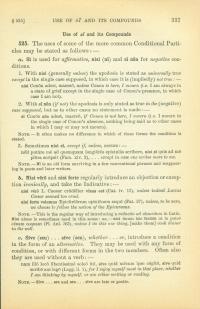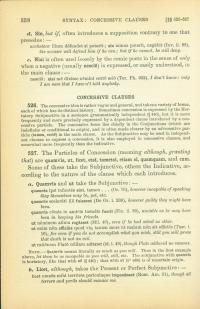525. The uses of some of the more common conditional particles may be stated as follows.
a. Sī is used for affirmative, nisi (nī) and sī nōn for negative conditions.
- With nisi (generally unless) the apodosis is stated as universally true except in the single case supposed, in which case it is (impliedly) not true.
Nisi Conōn adest, maereō.
Unless Conon is here, I mourn.
(i.e. I am always in a state of grief except in the single case of Conon's presence, in which case I am not) - With sī nōn (if not) the apodosis is only stated as true in the (negative) case supposed, but as to other cases no statement is made.
Sī Conōn nōn adest, maereō.
If Conon is not here, I mourn.
(i.e. I mourn in the single case of Conon's absence, nothing being said as to other cases in which I may or may not mourn)Note— It often makes no difference in which of these forms the condition is stated.
- Sometimes nisi sī (except if, unless) occurs.
nōlī putāre mē ad quemquam longiōrēs epistulās sorībere, nisi sī quis ad mē plūra scrīpsit (Fam. 14.2) except in case one writes more to me
Note— Nī is an old form surviving in a few conventional phrases and reappearing in poets and later writers.
b. Nisi vērō and nisi forte regularly introduce an objection or exception ironically, and take the Indicative.
nisi vērōL. Caesar crūdēlior vīsus est (Cat. 4.13) unless indeed Lucius Cæsar seemed too cruel
nisi forte volumusEpicūrēōrum opīniōnem sequī (Fat. 37) unless, to be sure, we choose to follow the notion of the Epicureans.
Note— This is the regular way of introducing a reductio ad absurdum in Latin. Nisi alone is sometimes used in this sense.
nisi ūnum hōc faciamut in puteō cēnam coquant (Pl. Aul. 365) unless I do this one thing, [make them] cook dinner in the well.
c. Sīve (seu) . . . sīve (seu) whether ... or, introduce a condition in the form of an alternative. They may be used with any form of condition, or with different forms in the two members. Often also they are used without a verb.
Nam illō locō libentissimē soleō ūtī, sīve quid mēcum ipse cōgitō, sīve quid scrībō aut legō. (Legg. 2.1) For I enjoy myself most in that place, whether I am thinking by myself, or am either writing or reading.
Note— Sīve . . . seu and seu . . . sīve are late or poetic.
d. Sīn (
Accūsātor illum dēfendet sī poterit; sīnminus poterit, negābit. (Inv. 2.88) The accuser will defend him if he can; but if he cannot, he will deny.
e. Nisi is often used loosely by the comic poets in the sense of only when a negative (usually nesciō) is expressed, or easily understood, in the main clause.
Nesciō: nisi mē dīxisse nēminī certō sciō. (Ter. Ph. 952) I don't know: only I am sure that I haven't told anybody.


